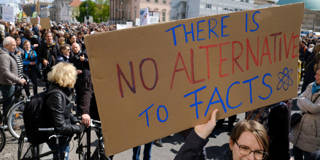For any democracy to be meaningful, citizens need open access to trustworthy information produced in a free and pluralistic environment. With this basic requirement being tested as never before, some of the world’s leading civil-society advocates are unveiling their plan to fight back.
PARIS – On December 10, 1948, the United Nations General Assembly adopted the Universal Declaration of Human Rights, affirming the view that “the will of the people” – democracy – should form the basis of any government. But seven decades later, the world’s democracies are in peril. After a fourfold increase in the number of democracies between the end of World War II and 2000, we are now in a sustained period of political regression. Once-open societies are veering toward dictatorship, and in many countries, despotic tendencies are strengthening.

PARIS – On December 10, 1948, the United Nations General Assembly adopted the Universal Declaration of Human Rights, affirming the view that “the will of the people” – democracy – should form the basis of any government. But seven decades later, the world’s democracies are in peril. After a fourfold increase in the number of democracies between the end of World War II and 2000, we are now in a sustained period of political regression. Once-open societies are veering toward dictatorship, and in many countries, despotic tendencies are strengthening.